Japan-Myanmar Relations
Prime Minister Abe Meets with the State Counsellor of Myanmar
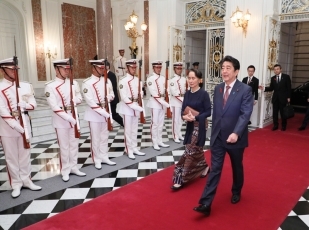 Photograph of the Prime Minister welcoming
Photograph of the Prime Minister welcoming the State Counsellor of the Republic of the
Union of Myanmar
(Photo: Cabinet Public Relations Office)
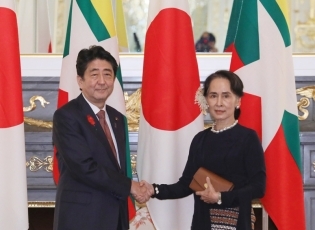 Photograph of the Prime Minister shaking hands
Photograph of the Prime Minister shaking hands with the State Counsellor of the Republic of the
Union of Myanmar
(Photo: Cabinet Public Relations Office)
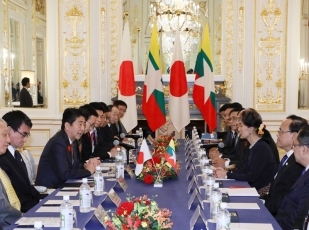 Photograph of the Prime Minister meeting with
Photograph of the Prime Minister meeting with the State Counsellor of the Republic of the
Union of Myanmar
(Photo: Cabinet Public Relations Office)
On October 9, commencing at around 5:55 p.m. for approximately 40 minutes, Mr. Shinzo Abe, Prime Minister of Japan, held a meeting with H.E. Ms. Aung San Suu Kyi, State Counsellor of the Republic of the Union of Myanmar, during her visit to Japan. The overview of the meeting is as follows. The meeting was attended by Mr. Taro Kono, Minister for Foreign Affairs; Mr. Yasutoshi Nishimura, Deputy Chief Cabinet Secretary; Mr. Yohei Sasakawa, Special Envoy of the Government of Japan for National Reconciliation in Myanmar; Mr. Kentaro Sonoura, Special Advisor to the Prime Minister; and others. After the meeting, the two leaders held a joint press announcement.
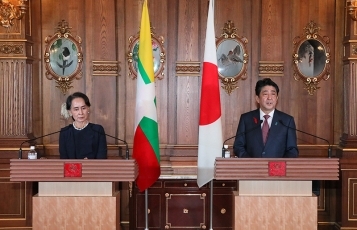 Photograph of the joint press announcement
Photograph of the joint press announcement
(Photo: Cabinet Public Relations Office)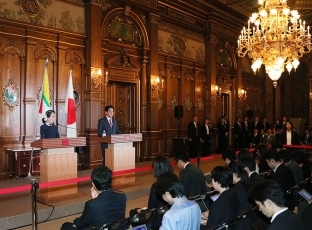 Photograph of the joint press announcement
Photograph of the joint press announcement
(Photo: Cabinet Public Relations Office)
1. Opening remarks
(1) Prime Minister Abe welcomed State Counsellor Aung San Suu Kyi’s second visit to Japan and expressed his pleasure at reuniting with her since their last meeting in Manila in November 2017. The Prime Minister commended the State Counsellor’s efforts in areas such as peace process, the situation in Rakhine State, and economic development over the two and a half years since the establishment of her government. The Prime Minister stated that Japan would continue to provide maximum support for Myanmar’s democratic nation-building efforts by bringing together its public and private sectors.
(2) State Counsellor Aung San Suu Kyi thanked Japan for making preparations for her visit to Japan on the occasion of the Mekong-Japan Summit Meeting. The State Counsellor highly valued the opportunity to discuss various economic and political matters with Japan during her stay in Japan. The State Counsellor also stated that the Government of Myanmar had been giving priority to economic development, the peace process, and the issue of Rakhine State and appreciated Japan’s understanding and support for the situation of Myanmar for finding sustainable solutions to the issues. The State Counsellor expressed her expectations for advancing the Mekong-Japan cooperation and for Prime Minister Abe’s visit to Myanmar.
2. Economic cooperation
(1) Prime Minister Abe stated that Japan’s 800 billion yen contribution to Myanmar over five years by its public and private sectors had made steady progress. He noted that the Dawbon Bridge (New Thaketa Bridge) opened with Japanese assistance in August, and that a container terminal at Thilawa Port constructed and operated by Japanese companies was scheduled for completion in December. He emphasized that Japan was committed to continuing to work with Myanmar for creating conditions that could encourage foreign investment in Thilawa Special Economic Zone (SEZ). Prime Minister Abe stated that these efforts would also contribute to enhancing connectivity, one of the pillars of the Mekong-Japan cooperation. Furthermore, the Prime Minister stated that Japan had decided to implement two new projects in the Yangon city, and that, through these projects, Japan would provide supports for improving the lives of the people in Myanmar by addressing chronic traffic jams and road flooding during the monsoon season as well as expanding and rebuilding sewerage facilities.
(2) State Counsellor Aung San Suu Kyi replied that improvement of roads and electricity would be especially critical for rural development and that supports for small and medium-sized enterprises (SMEs) promoting agricultural development would also generate positive outcomes.
3. Peace process
(1) Prime Minister Abe stated that, in cooperation with Mr. Sasakawa, Special Envoy of the Government of Japan for National Reconciliation in Myanmar, Japan would continue to encourage the ethnic armed groups who had not yet signed the ceasefire agreements to sign them promptly, and, at the same time, to enhance reconstruction assistance in areas that had achieved ceasefire.
(2) State Counsellor Aung San Suu Kyi expressed appreciation for the Japanese assistance towards advancing the peace process of Myanmar.
4. Situation in Rakhine State
Prime Minister Abe stated that Japan would think together with Myanmar and support the efforts of Myanmar regarding the situation in Rakhine State and emphasized the following points.
(1) It is important that the credibility and transparency of the investigation of the Independent Commission of Enquiry (ICOE) are ensured and that appropriate measures are taken based on the investigation findings. The Government of Japan requests the Government of Myanmar to fully cooperate and support the activities of the ICOE.
(2) The Government of Japan requests the Government of Myanmar to accelerate creating conditions for receiving the return of the displaced persons and expects that it will expand its cooperation with the United Nations agencies in this regard. Japan plans to begin construction of housing and other infrastructure in two villages in the northern Rakhine State in late November and will also support improvement of roads, electricity, and water supply for the entire State.
(3) It is important to close the camps for internally displaced persons (IDPs) and resettle them in an appropriate manner while ensuring their security and freedom of movement.
In addition, Prime Minister Abe reiterated Japan’s concern on the case involving the detained Reuters journalists.
State Counsellor Aung San Suu Kyi stated that the Government of Myanmar was taking steps to enable the ICOE to carry out an effective investigation in a free and independent manner, that its military and police authorities were obliged to cooperate with the ICOE, that the Government of Myanmar is making maximum efforts to create conditions for receiving the return of displaced persons, and that it was addressing the case of the Reuters journalists in accordance with the law.
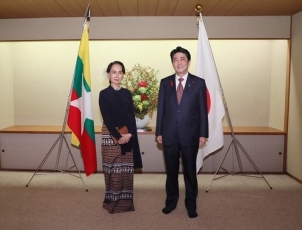 Photograph of the banquet hosted by the Prime Minister
Photograph of the banquet hosted by the Prime Minister
(Photo: Cabinet Public Relations Office)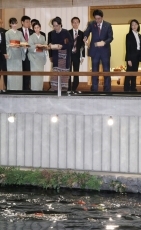 Photograph of the banquet hosted
Photograph of the banquet hosted
by the Prime Minister
(Photo: Cabinet Public Relations Office)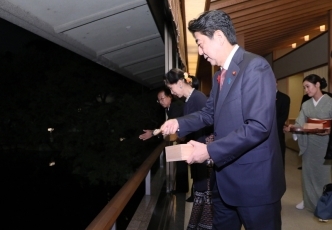 Photograph of the banquet hosted by the Prime Minister
Photograph of the banquet hosted by the Prime Minister
(Photo: Cabinet Public Relations Office)
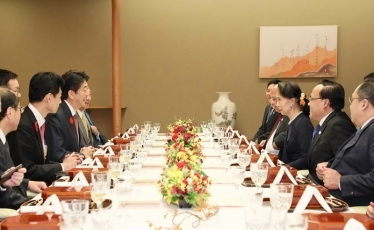 Photograph of the banquet hosted by the Prime Minister
Photograph of the banquet hosted by the Prime Minister
(Photo: Cabinet Public Relations Office)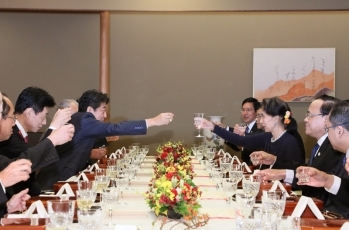 Photograph of the banquet hosted by the Prime Minister
Photograph of the banquet hosted by the Prime Minister
(Photo: Cabinet Public Relations Office)

